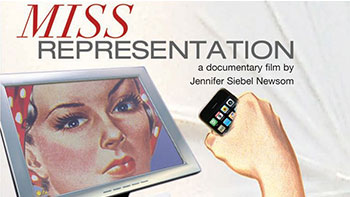Intern Kathryn Doorey reflects on this exclusive clip from Miss Representation…
Times are tough for American teenagers and young adults. Opportunities that were once readily available are becoming more difficult to attain. The overwhelming financial and educational challenges that we face usher in a particular competitive climate, and force us to evaluate how our abilities, talents, and overall achievements fit into this fast-paced, chaotic world.
So it is no surprise that feeling threatened by another’s success – the ‘natural instinct’ Devanshi Patel describes in the extra clip from Miss Representation above – is something commonly felt among young women and girls still growing into their identities. With the stakes rising higher in virtually every aspect of our lives, coupled with a hyper-dramatized media that rewards catfights, conflict, and maliciousness with airtime, female-to-female encouragement – what it looks like, how it’s cultivated — faces a toxic counter-culture.
This comes at a price women can no longer afford to pay.
Our voices are already stifled, with women grossly underrepresented in politics, entertainment, government and major companies. In choosing not to support our female peers, we further an already overtly communicated message that women aren’t smart enough, pretty enough, talented enough, whatever enough to be what they truly aspire to be.
We can spot the media’s go-to theme, exploiting the most toxic, destructive aspects of competition, and turning women against one another through a narrative of backstabbing, lying, cheating and cartoonish, one-dimensional conflict that we see consume every aspect of human life: [dating (The Bachelor), business (The Apprentice), physical beauty (America’s Next Top Model/ Biggest Loser), and consumerism (Real Housewives/Cribs/Sweet Sixteen)]. Additionally, healthy, realistic portrayals of support are a rarity.
In the above clip, Rosario Dawson calls it a culture of “the weakest link” and she laments the way the entertainment industry has shifted in that direction. We’ve got to move it back towards sanity. We can no longer give attention to the media’s baiting, and instead have to see the amazing achievements in the women among us — like Rosario, Lisa and Devanshi —- who are mindful of how their contributions can improve the cultural climate.
One of the major changes women need to make for one another is to cease the criticizing, undermining attitudes and replace them with supportive partnerships that foster development of talents, abilities and confidence.
Isn’t that the kind of cultural environment we want to live in?
As Jennifer Pozner explains in her book Reality Bites Back,
All social, academic, professional, and political gains women have made in this country…have been won through hard-fought collective struggle with other women. If women are conditioned to consider other women lying backstabbers, we are less likely to organize together for better work conditions or pay equity.
Competition can sometimes be a driving force in understanding our individual capabilities in the context of what teammates, co-workers, or fellow students are also working so hard at. But for the women represented on our screens, it can easily transform into a negative, volatile force in which no one wins.
We want to ultimately see a society in which women do not see one another as competition, but support and encourage each other in their goals. This support demands a confidence and reassurance in ourselves, and the acknowledgement that one woman’s success does not diminish our own; instead, it can only lead to a shift in women pursuing, and achieving, in their fullest capacity.
And no economic, educational, or national crisis can touch such solidarity. Perhaps it is the only thing that can reform our nation.
by Kathryn Doorey




